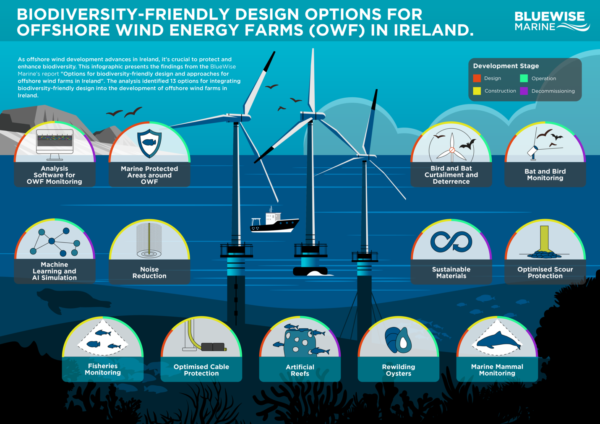BlueWise Marine’s study on nature-positive design identified 13 effective solutions ready for use in offshore wind projects in Ireland. However, clear standards, effective monitoring, and detailed guidance for developers are needed.
A recent report, ‘Options for Biodiversity-friendly Designs and Approaches for Offshore Wind Farms in Ireland’, identified 13 nature-based solutions (NBS) with high potential for Ireland’s Phase One offshore wind projects. These solutions, which enhance habitats for species affected by offshore wind farms (OWFs), have been successfully tested in ecological restoration projects and are well-suited to Ireland’s species and habitats. NBS initiatives, such as combining lobster hatcheries with habitat restoration, can often be integrated for greater ecological impact.
Enhancing biodiversity in offshore wind projects
The report presents the findings of a literature review and analysis of initiatives for integrating biodiversity aspects into the design, construction, operation, and decommissioning of offshore wind farms (OWFs) in Ireland. The aim of this study was to identify and evaluate options for enhancing biodiversity in offshore wind projects. The review primarily focused on projects and initiatives conducted in North America and Europe that are particularly relevant to the species and habitats found in Ireland.
Both Irish and EU laws recommend incorporating biodiversity considerations into offshore wind projects, and companies like RWE, SSE Renewables, and Ørsted have adopted nature-positive policies.
Implementation matters
While Ireland has policies supporting biodiversity, practical standards and requirements are still needed. For example, the Offshore Wind Delivery Taskforce (OWDT) could mandate NBS integration at the planning stages, informed by early environmental assessments. Improved monitoring guidelines for species like bats, fish, and marine mammals are also essential for mitigating ecological impacts. The new EU Life Programme’s biodiversity data platform could help bridge data gaps.
To support developers, a national roadmap or catalogue could provide guidance on NBS initiatives, legal frameworks, and ecological considerations. This approach, seen in the Netherlands, US, and UK, could help ensure nature-positive offshore wind development.
Moving forward
While high-level in nature, the report emphasises that each project will require a tailored design approach with extensive stakeholder consultation.
Nature-inclusive designs can restore degraded habitats, boost ecological functions, and promote biodiversity. Though still relatively novel with some data gaps, these approaches hold a promise of nature-positive offshore wind development in Ireland.
